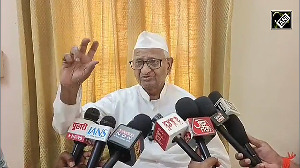Pakistan President Pervez Musharraf cannot get re-elected in uniform constitutionally because his authority to retain both offices does not apply to his next term as the nation's President, former Supreme Court judges have said.
"Article 41(7) safeguards the president, but justification for holding two offices at the same time is only for his current tenure and not for the next term," The News reported Monday, quoting former apex court Justice Wajihuddin Ahmed as saying.
Even if he quits as army chief after completing his current tenure as president, the former judge said that "Article 63 obstructs him as no government servant can be elected to the National Assembly or hold a public office until two years after his retirement."
Ahmed also pointed out that the sitting assemblies that were elected for a five-year term could not re-elect Musharraf as president during their tenure. "Neither is it constitutionally possible no can there be any political or moral justification for it."
Agreeing to Ahmed's views, another retired judge Nasir Aslam Zahid asserted that the President "can neither be elected in uniform nor without it" and said that "even if emergency is imposed on the country" to extend the tenure of the assemblies by one year, constitutionally they would not be able to re-elect Musharraf for ten years.
Secondly, according to him, if Musharraf tried to amend the Constitution, both Pakistan Muslim League and former Prime Minister Benazir Bhutto's Pakistan People's Party would have to prove two-third majority in the assemblies.
However, Zahid said that with the restoration of Chief Justice Iftikhar M. Chaudhry, "any unconstitutional or ambiguous step would be challenged in the Supreme Court".
"Article 63 of the Constitution is also applicable on the President," he was quoted by the daily.






 © 2025
© 2025